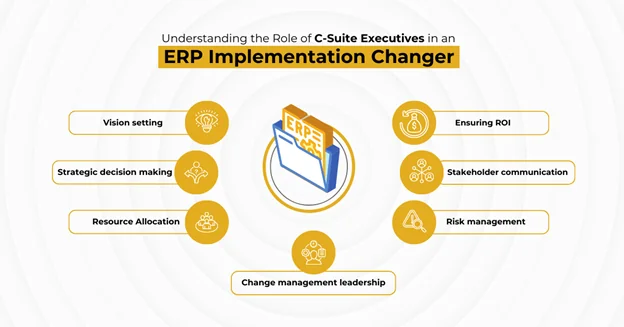Building Your Team for NetSuite Implementation

Home » Blog » Project Management & Resource Planning » Building Your Team for NetSuite Implementation


NetSuite, a leading cloud-based Enterprise Resource Planning (ERP) solution, has revolutionized how businesses manage their operations. However, adopting this robust platform requires careful planning, technical expertise, and strategic leadership. That’s where the right team comes into play for successful NetSuite implementation.
Mapping NetSuite implementation journey is akin to make the most on your ROI. Much like a grand vessel embarking on an expedition, there’s a need for a captain to lead, navigators to chart the course, deckhands to manage daily operations, and a multitude of other crew members, each playing a pivotal role in ensuring a smooth journey and safe arrival at the intended port.
Navigating the waters of ERP transformation without clearly defined roles is like a ship sailing aimlessly without its crew. The success of a NetSuite implementation is anchored in clear communication, collaboration, and accountability — all derived from having a well-organized crew with defined responsibilities.
By understanding and appointing the right roles to the right individuals, organizations can set a clear course towards a smooth, efficient, and effective ERP integration, ensuring that every part of the process sails in harmony. In this post, we will chart the course, outlining the crucial roles required for a NetSuite implementation and explaining why each crew member is vital to the success of the voyage.
In any orchestra, each musician knows their part, and the symphony only reaches its full potential when every instrument plays in harmony. Similarly, the intricate process of a NetSuite implementation can be likened to such an orchestra, where each role, each individual, contributes to the larger melody of success. Defining these roles isn’t just a formality—it’s the bedrock upon which the entire implementation project rests. Here’s why:
In conclusion, defining roles is not just about allocating tasks—it’s about creating a cohesive, accountable, and efficient team that works in tandem towards the shared goal of a successful NetSuite implementation. As we delve deeper into each specific role in the sections to follow, remember that each individual, each role, is a vital note in the grand symphony of your ERP transformation.

In the corporate ecosystem, the C-Suite—comprising Chief Executive Officers (CEOs), Chief Information Officers (CIOs), Chief Operating Officers (COOs), and other top-tier leadership roles—acts as the strategic compass, steering the ship and providing direction.
Their involvement in a NetSuite implementation, while perhaps not granular, is absolutely foundational. Let’s unravel the pivotal roles and responsibilities they shoulder during this transformative journey:
While the C-Suite may not be in the trenches of daily implementation tasks, their strategic oversight, direction-setting, and unwavering support are the winds that propel the sails of a NetSuite implementation. Their leadership ensures that the organization doesn’t just adopt a new system, but truly transforms in a way that aligns with its long-term vision and goals.
When diving into a NetSuite implementation, IT Managers and Directors play a pivotal role, overseeing and ensuring the technical aspects of the project run seamlessly. Here’s a breakdown of their key responsibilities:
In summary, IT Managers/Directors are the backbone of any NetSuite implementation, ensuring that the technical aspects are managed efficiently, and that the organization is well-prepared to make the most of the new system.
Ready to build your dream team for NetSuite implementation success? Partner with AlphaBOLD for expert Project Management and Resource Planning services. Let's embark on your journey together!
Request a ConsultationProject Managers play a quintessential role in the life cycle of a NetSuite implementation. Their expertise bridges the gap between technical execution and business strategy. From conception to completion, they oversee the intricate details, ensuring the project stays on track and meets its objectives. Here’s a closer look at the essential responsibilities of Project Managers during a NetSuite implementation:
In essence, Project Managers are the navigational beacons of a NetSuite implementation. Their meticulous oversight, management acumen, and attention to detail ensure that the organization successfully transitions to the new system with minimal hiccups, on time, and within budget.

Unlock the secrets to a successful NetSuite ERP implementation with our comprehensive user handbook.
Learn more
Business Analysts play a crucial role in a NetSuite implementation by serving as the critical link between the organization’s specific needs and the technical solutions provided by the ERP system. Their work lays the foundation for a successful implementation.
By gathering in-depth requirements from various stakeholders and analyzing existing processes, Business Analysts ensure that the new system is not just a technology upgrade but a solution that will effectively address the unique challenges and goals of the business. Through detailed documentation and strategic insights, they provide the actionable roadmap that guides the implementation process from start to finish.
In summing up the pivotal role of Business Analysts in a NetSuite implementation, it’s evident that they are more than just intermediaries. Their analytical prowess, deep understanding of both business and technology landscapes, and ability to translate intricate requirements into actionable plans make them indispensable.
Their involvement ensures that the NetSuite platform is not just implemented, but truly integrated into the organization, promising not only enhanced efficiency but also long-term strategic alignment. The success of an ERP transition can often hinge on the groundwork laid by these professionals, underlining their paramount importance in the process.
Read More: ERP Software Comparison: Key Insights for Executives
The intricate financial decisions and oversight required during a NetSuite implementation rest squarely on the shoulders of Finance Executives. Their keen financial acumen, combined with a deep understanding of the organization’s fiscal health and goals, ensures that the implementation process is both cost-effective and value driven.
As gatekeepers of the organization’s financial resources, they play an indispensable role in ensuring that the NetSuite transition yields the desired return on investment, while adhering to the set budgetary constraints. Finance Executives are held accountable for the following:
In wrapping up the role of Finance Executives in a NetSuite implementation, it’s clear that their strategic financial oversight is the linchpin of a successful transition. They safeguard the organization’s fiscal interests and lay the groundwork for maximizing the benefits derived from the investment.
Through meticulous budgeting, cost tracking, and ROI analysis, Finance Executives ensure that the organization moves forward with a clear financial vision, making certain that the NetSuite implementation translates into tangible, long-term value. Their proactive and strategic approach underscores their crucial role in driving the project’s financial success.
Read More: Why ERP Implementation Fail?
Seeking to optimize your team's performance for NetSuite implementation? Leverage AlphaBOLD's Project Management and Resource Planning services for a tailored approach. Elevate your implementation journey.
Request a ConsultationA NetSuite implementation requires a coordinated effort from multiple stakeholders, each bringing a unique set of skills and responsibilities to the table. Every role is crucial, ensuring that different facets of the implementation are managed effectively.
C-Suite Executives provide leadership, set priorities, and ensure the implementation aligns with the business strategy.
Business Analysts gather and analyze business requirements, ensuring the NetSuite system is configured to meet the organization’s specific needs.
Finance Executives manage the financial aspects of the project, from budgeting to tracking expenses and ensuring a healthy return on investment.
In conclusion, the success of a NetSuite implementation hinges on the collaboration of these roles. Their combined expertise and efforts ensure the implementation is seamless, aligned with business goals, and brings tangible value to the organization.
Understanding the intricate roles in an ERP implementation is essential, but having a seasoned partner by your side can make all the difference. AlphaBOLD, as a specialized NetSuite partner, brings expertise and insights tailored to your organization’s unique needs. Why not leverage our vast experience in NetSuite implementations to ensure your transition is smooth and efficient?
Don’t leave your ERP transition to chance. Let us help you demystify the process and guide you in establishing the right internal roles for success.
📞 Reach out to AlphaBOLD today and take the first step towards a successful NetSuite implementation that truly aligns with your business objectives. Contact Us


